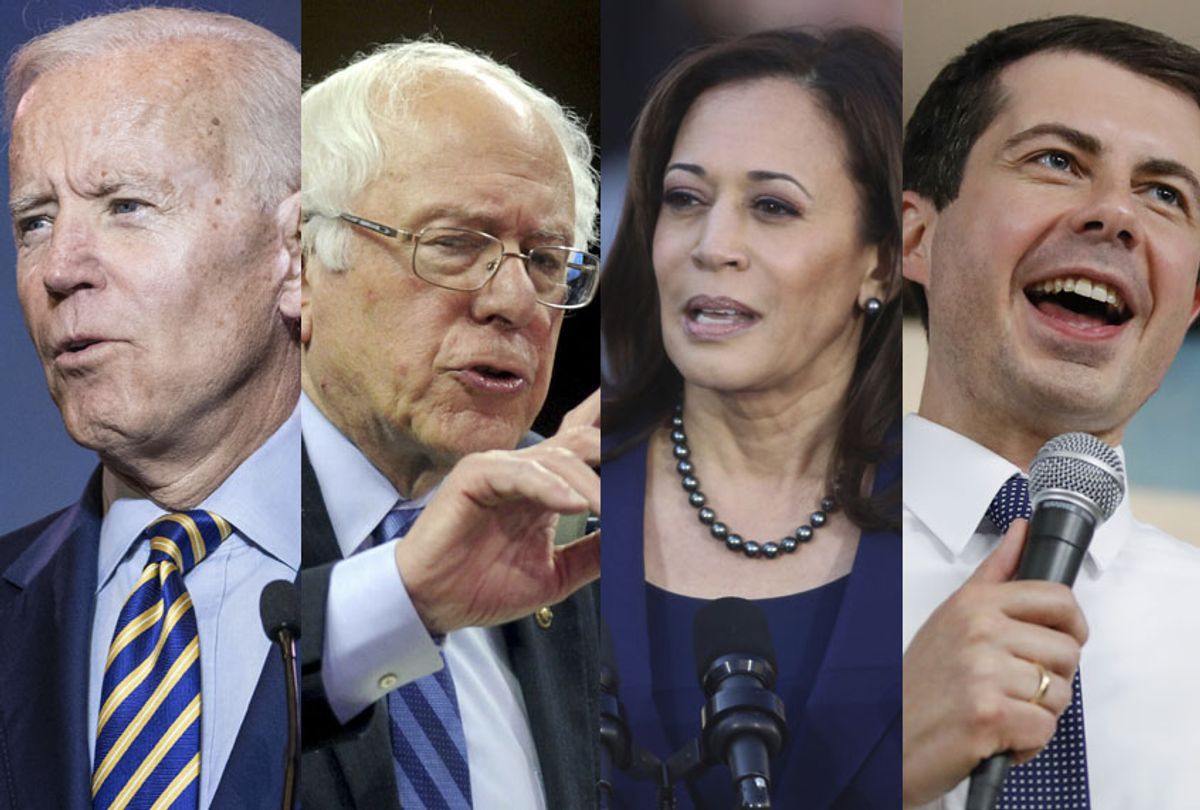On the second night of the Democratic primary debates on Thursday, most of the highest-polling candidates appeared at the center of the stage. The top two at the center were Vice President Joe Biden and Vermont Sen. Bernie Sanders, flanked by California Sen. Kamala Harris and Mayor Pete Buttigieg. Ten other candidates, including the other top tier candidate Sen. Elizabeth Warren, participated in a separate debate the previous night.
While it can be hard to say how an evening really affected voters — and the most likely outcome for any individual candidate is that nothing much will change — some contenders on the stage show clear strengths and weaknesses.
Here’s the — necessarily subjective — ranking of winners and losers for the night. Not everyone is listed because many people didn’t seem to do much to hurt or help themselves; they were just treading water.
Winners
Kamala Harris
Harris was the star of the night. She had several moments in the debate that were showstoppers — most notably when she challenged Biden on his past comments about desegregation and tied it to her own personal experience. She was able to connect on a powerful, emotional level, but she also seemed at ease and authoritative when talking about any other topic that came up. And by challenging Biden, she not-so-subtly showed how she could just as confidently take on Trump, were she to face off against him in the general election. Meanwhile, no other candidate really tried to challenge her. She proved why she belongs in the top-tier of the primary, and she likely encouraged many voters who are leaning toward another choice to give her a second look.
Kirsten Gillibrand
Despite being a senator from a large state, Gillibrand hasn’t made much of an impact on the Democratic primary thus far. And to be frank, she probably didn’t change the trajectory of the race Thursday night. But she demonstrated why she has become a successful senator from New York. Her best moment came when she confidently explained why the critics of Medicare-for-All are wrong when they say it will take away private health insurance, emphasizing that she was the one who designed a transition period in Sanders’ health care bill. And she managed to repeatedly claim the spotlight on a crowded stage, something some of the lesser-known candidates struggled to do. It doesn’t mean she’ll be polling in a dead heat with Bernie Sanders any time soon, but she showed she has a place in this race — which hasn’t always been certain.
Anti-Trump voters
One of the complaints about the first night of the debate was that Trump’s name was hardly mentioned. But on the second night, the president — and the harm he’s doing to the country and the world — was frequently invoked. If you’re looking for a Democratic Party enthusiastic to rake Trump over the coals and emphasize their contrasts with him, the candidates on stage Thursday delivered.
Losers
Joe Biden
It was Biden’s night to lose on Thursday, and while he is able to present himself with the authority one would expect of a former vice president, he did little to reinforce the most common argument for his candidacy: that he’s best able to defeat Trump. At one point he seemed to suggest, perhaps unintentionally, that the NRA is not the “enemy” in the gun control debate. And in the dispute with Harris over his history on segregation policies and his friendships with racists in the Senate, he was put on the defensive. He resists apologizing for his past positions, which ends up reinforcing the most negative perceptions about him as an out of touch and regressive relic from a previous era.
It’s possible this won’t hurt him with his core supporters, who view his time in President Barack Obama’s administration fondly. But Biden should be doing his best to allay the doubts about his candidacy; Thursday night only emphasized them.
Marianne Williamson
Williamson, an author and speaker, was one of the biggest wildcards on the debate stage Thursday night. For those looking for something different, she was that. She frequently seemed not sure when she was supposed to be talking, and when she did talk, she rambled. Some of her comments were just bizarre; she dismissed the discussion of various plans for universal health care as “superficial,” while saying Trump won in 2016 because of his campaign slogan. And she said that she will harness the power of “love” and use it to defeat Trump’s “fear.” It was… weird.
Eric Swalwell
Swalwell clearly went into the debate when the intention to make the case that a younger generation should take the lead in the Democratic Party. It could be a useful contrast for him to draw with Biden and Sanders, but it mostly just ended up seeming like an argument for Buttigieg, who has had a much more significant showing in the polls than Swalwell ever has.
Andrew Yang
Yang was another wildcard candidate, an entrepreneur running on the bold idea of giving every American adult $1,000 a month. But as an introduction to most the country, Yang’s performance was likely insufficient to overcome the natural skepticism his candidacy stirs. Particularly at the beginning, his speech was stiff, stilted, unemotional, and hard to follow, and he threw out ideas like a value-added tax without explaining them. For voters to consider a true outsider candidate, they’ll need a very good reason to abandon the rest of the field with a diverse array of political experiences and the confidence that he could implement his radical ideas. Yang didn’t give them that.


Shares